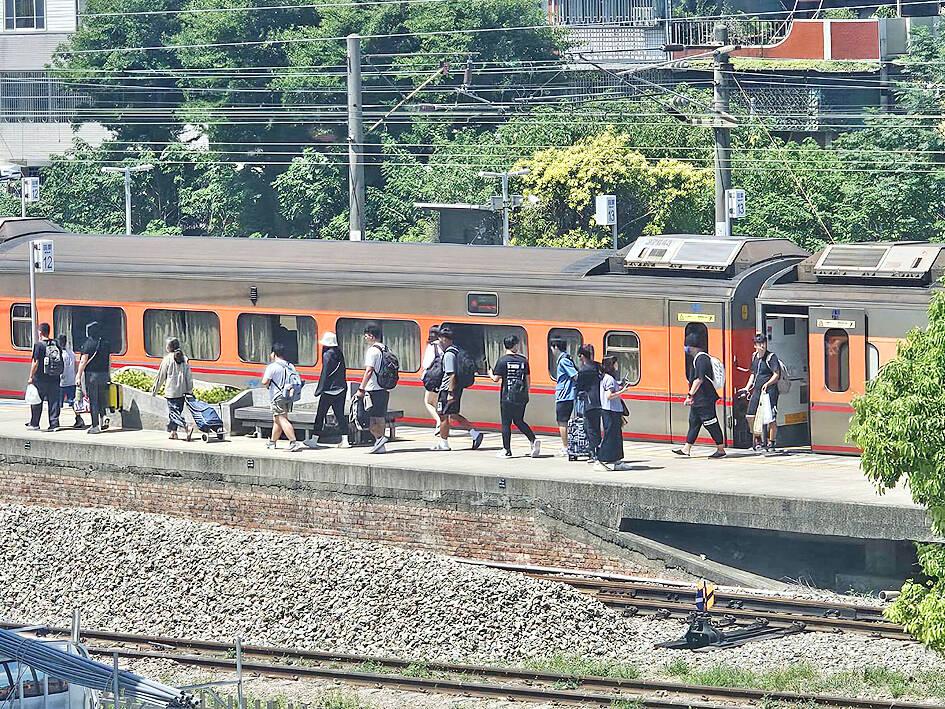Taiwan railway ticket prices may increase for the first time in 30 years, as the Taiwan Railway Corp (TRC) is proposing an average fare increase of 26.8 percent to its board of directors this afternoon.
According to the Legislative Yuan, a reasonable rate of return for TRC ticket revenue is 3 to 5 percent.
However, critics have raised concern that this rate would cause ticket prices to rise too much, significantly impacting the public.

Photo: Peng Chien-li, Taipei Times
The TRC plans to set the return rate at no lower than 0.36 percent, with the average fare to be increased by 26.8 percent.
The company said it plans to adjust fares proportionally based on distance traveled, with short-distance fares increasing more and long-distance fares increasing less.
For example, the fare for the Tze-Chiang Limited Express between Taipei and Kaohsiung would increase from NT$824 to NT$975.
Meanwhile, the fare for the Tze-Chiang express from Taichung to Taipei would increase from NT$375 to NT$501.
A local train from Taipei to Banciao District (板橋) would cost NT$22, while the Tze-Chiang express for the same journey would cost NT$34.
A local train from Taipei to Hualien would increase from NT$283 to NT$375, and the Tze-Chiang express for the same journey would increase from NT$440 to NT$583.
An announcement would be made if the fare adjustment plan is approved by the board of directors this afternoon, TRC chairman Du Wei (杜微) said.
The plan would be designed with three key considerations: affordability for short-distance passengers, competitiveness for medium-distance routes and retention of long-distance passengers, Du said.

Eight restaurants in Taiwan yesterday secured a one-star rating from the Michelin Guide Taiwan for the first time, while three one-star restaurants from last year’s edition were promoted to two stars. Forty-three restaurants were awarded one star this year, including 34 in Taipei, five in Taichung and four in Kaohsiung. Hosu (好嶼), Chuan Ya (川雅), Sushi Kajin (鮨嘉仁), aMaze (心宴), La Vie by Thomas Buhner, Yuan Yi (元一) and Frassi in Taipei and Front House (方蒔) in Kaohsiung received a one-star rating for the first time. Hosu is known for innovative Taiwanese dishes, while Chuan Ya serves Sichuan cuisine and aMaze specializes

Taitung County is to launch charter flights to Malaysia at the end of this year, after setting up flights to Vietnam and Thailand, the Taitung County Government said yesterday. The new charter flight services, provided by low-cost carrier Batik Air Malaysia, would be part of five-day tour packages for visits to Taitung County or Malaysia. The Batik Air charter flight, with about 200 seats, would take Malaysian tourists to Taitung on Dec. 30 and then at 12:35pm return to Kuala Lumpur with Taiwanese tourists. Another charter flight would bring the Taiwanese home on Jan. 3 next year, arriving at 5:30pm, before taking the

STATS: Taiwan’s average life expectancy of 80.77 years was lower than that of Japan, Singapore and South Korea, but higher than in China, Malaysia and Indonesia Taiwan’s average life expectancy last year increased to 80.77 years, but was still not back to its pre-COVID-19 pandemic peak of 81.32 years in 2020, the Ministry of the Interior said yesterday. The average life expectancy last year increased the 0.54 years from 2023, the ministry said in a statement. For men and women, the average life expectancy last year was 77.42 years and 84.30 years respectively, up 0.48 years and 0.56 years from the previous year. Taiwan’s average life expectancy peaked at 81.32 years in 2020, as the nation was relatively unaffected by the pandemic that year. The metric

Taiwan High Speed Rail Corp. (THSRC) plans to ease strained capacity during peak hours by introducing new fare rules restricting passengers traveling without reserved seats in 2026, company Chairman Shih Che (史哲) said Wednesday. THSRC needs to tackle its capacity issue because there have been several occasions where passengers holding tickets with reserved seats did not make it onto their train in stations packed with individuals traveling without a reserved seat, Shih told reporters in a joint interview in Taipei. Non-reserved seats allow travelers maximum flexibility, but it has led to issues relating to quality of service and safety concerns, especially during